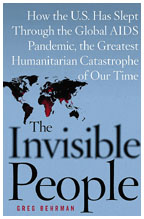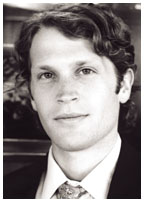October 20, 2004: Reading Room
Greg Behrman ’98 calls the fight against global AIDS “the defining moral challenge of our time.” (Stacey Lieberman) |
The
invisible people
Greg Behrman ’98 looks at the U.S.’s response
to global AIDS
While studying international relations at Oxford University, Greg Behrman ’98 began reading about the AIDS pandemic exploding across Africa and spreading to India, China, and Russia. Stunned by the human toll — 65 million people have been infected and 8,000 people die every day — he wondered what the world’s wealthiest country had done to stop the spread of the disease. His answer: very little. Behrman, author of The Invisible People: How the U.S. Has Slept Through the Global AIDS Pandemic, published by Free Press in June, spoke with PAW’s Katherine Federici Greenwood.
What’s gone wrong with the United States’ response to the global AIDS crisis?
Leaders like Bill Clinton, who knew about this and who addressed it in his first inaugural address, lacked the political will to lead on it. There were no domestic political constituencies trumpeting global AIDS. You combine that with the fact that it was most acutely affecting Africa, deemed a place of geostrategic irrelevance, traditionally a neglected continent. You also have to look at the backdrop of U.S. culture in the 1990s. The Cold War was over. There wasn’t a great deal of focus abroad. There was AIDS at home and very little appetite to think globally about this problem. Finally, you have the fundamental latency of the disease, where there’s a lag from infection to death. So even as HIV infections were mounting in the late 1980s and throughout the 1990s, people weren’t dying in large numbers.
 Is
President Bush’s five-year, $5-billion plan to fight global AIDS
working?
Is
President Bush’s five-year, $5-billion plan to fight global AIDS
working?
The U.S. effort now has an unprecedented amount of institutional resources and capital to draw on and an unprecedented amount of institutional coherence. It’s clear now that this is a priority. Bush’s plan constitutes an awakening to the enormity of the problem. We’re moving in the right direction, but still we’re moving way too slowly.
You authored a report for the Council on Foreign Relations Roundtable on improving U.S. global AIDS policy. What did you recommend?
Right now you have a plethora of players involved in fighting AIDS: various countries, private donors, United Nations agencies. Each of these players has its own agenda, budget, and distinct approach, so it creates an enormous amount of fragmentation and duplication on the ground. The report calls for a long-term global strategy with one set of goals and a common budget.
How does the spread of global AIDS affect America’s security?
Nations ravaged by AIDS create breeding grounds for terrorists. The
disease leads to privation, social dislocation, and want, which are conditions
that inflame radicalism and may help breed a new cadre of terrorists.
In southern Africa, for example, up to 35 percent of adult populations
are infected. The disease affects cabinet officers, military leaders,
teachers, and doctors. With that level of infection on top of other problems,
social, economic, and political institutions become threatened with deterioration
or collapse, making it easier for terrorists to operate within a country.
![]()
BOOK SHORTS
 The Power Game: A Washington Novel — JOSEPH S. NYE JR.
’58 (Public Affairs). Nye’s debut novel focuses on Princeton
professor Peter Cutler, who leaves academia to become undersecretary of
state. Before long, he gets involved in bureaucratic turf wars and an
illicit affair. Ultimately, Cutler is made the scapegoat for a botched
CIA operation to stop the transfer of nuclear weapons from Pakistan to
Iran. The author of The Paradox of American Power (2002), Nye is a professor
at Harvard University.
The Power Game: A Washington Novel — JOSEPH S. NYE JR.
’58 (Public Affairs). Nye’s debut novel focuses on Princeton
professor Peter Cutler, who leaves academia to become undersecretary of
state. Before long, he gets involved in bureaucratic turf wars and an
illicit affair. Ultimately, Cutler is made the scapegoat for a botched
CIA operation to stop the transfer of nuclear weapons from Pakistan to
Iran. The author of The Paradox of American Power (2002), Nye is a professor
at Harvard University.
 The Fate of Their Country: Politicians, Slavery Extension, and the Coming
of the Civil War — MICHAEL F. HOLT ’62 (Farrar, Straus
& Giroux). The author argues that war didn’t arise from two
irreconcilable economies or from the North’s objections to slavery,
but from partisan politics. Concerned with re-election, politicians from
both sides exploited the debates about the extension of slavery into new
territories to such an extent that disunion became inevitable. Holt teaches
history at the University of Virginia.
The Fate of Their Country: Politicians, Slavery Extension, and the Coming
of the Civil War — MICHAEL F. HOLT ’62 (Farrar, Straus
& Giroux). The author argues that war didn’t arise from two
irreconcilable economies or from the North’s objections to slavery,
but from partisan politics. Concerned with re-election, politicians from
both sides exploited the debates about the extension of slavery into new
territories to such an extent that disunion became inevitable. Holt teaches
history at the University of Virginia.
 Into Perfect Spheres Such Holes Are Pierced — CATHERINE
BARNETT ’82 (Alice James Books). After her two young nieces died
in a plane crash, the author wrote this series of elegies exploring grief
and mourning. This collection of lyric poems, which narrates the girls’
death and their family’s experience of loss and despair, won the
2003 Beatrice Hawley Award. Barnett teaches creative writing at New York
University.
Into Perfect Spheres Such Holes Are Pierced — CATHERINE
BARNETT ’82 (Alice James Books). After her two young nieces died
in a plane crash, the author wrote this series of elegies exploring grief
and mourning. This collection of lyric poems, which narrates the girls’
death and their family’s experience of loss and despair, won the
2003 Beatrice Hawley Award. Barnett teaches creative writing at New York
University.
By K.F.G.
For a complete list of books received, click here.

